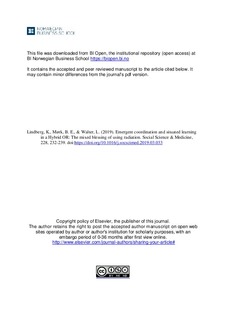| dc.contributor.author | Lindberg, Kajsa | |
| dc.contributor.author | Mørk, Bjørn Erik | |
| dc.contributor.author | walter, lars | |
| dc.date.accessioned | 2019-08-09T11:51:42Z | |
| dc.date.available | 2019-08-09T11:51:42Z | |
| dc.date.created | 2019-05-14T21:53:23Z | |
| dc.date.issued | 2019 | |
| dc.identifier.citation | Social Science and Medicine. 2019, 228 (May), 232-239. | nb_NO |
| dc.identifier.issn | 0277-9536 | |
| dc.identifier.uri | http://hdl.handle.net/11250/2607774 | |
| dc.description.abstract | Mobilising knowledge and coordinating actions in order to make use of new innovations and technologies is a major challenge in the health care sector. Drawing upon a longitudinal, qualitative study of a Hybrid Operating Room in Sweden, we illustrate how the staff from a variety of medical specialties need to coordinate their tasks and competencies, and learn how to use the technology in a safe way. This study shows that learning across highly-professionalised communities is a recursive process of emergent coordination and situated learning, which includes the acknowledgement of others’ expertise, task interdependence, and the pragmatic accommodation of latitude and control. Moreover, there was continuous negotiations between the different communities about what should constitute approved practice based on the task being performed. This obstructed the development of a dominant community with the authority to independently exclude other communities. We thus conclude that emergent coordination of tasks and expertise is an important aspect of learning how to use technologies that break with conventions of established and previously separated practices. | nb_NO |
| dc.language.iso | eng | nb_NO |
| dc.publisher | Elsevier | nb_NO |
| dc.relation.uri | Sweden, situated learning, communities of practice, emergent coordination, new technology, qualitative study | |
| dc.rights | Attribution-NonCommercial-NoDerivatives 4.0 Internasjonal | * |
| dc.rights.uri | http://creativecommons.org/licenses/by-nc-nd/4.0/deed.no | * |
| dc.subject | Sweden | nb_NO |
| dc.subject | Situated learning | nb_NO |
| dc.subject | Communities of practice | nb_NO |
| dc.subject | Emergent coordination | nb_NO |
| dc.subject | New technology | nb_NO |
| dc.subject | Qualitative study | nb_NO |
| dc.title | Emergent Coordination and Situated Learning in Hybrid ORs: The mixed blessing of using radiation | nb_NO |
| dc.type | Journal article | nb_NO |
| dc.type | Peer reviewed | nb_NO |
| dc.description.version | acceptedVersion | nb_NO |
| dc.rights.holder | Copyright policy of Elsevier, the publisher of this journal. The author retains the right to post the accepted author manuscript on open web sites operated by author or author's institution for scholarly purposes, with an embargo period of 0-36 months after first view online. | nb_NO |
| dc.source.pagenumber | 232-239 | nb_NO |
| dc.source.volume | 228 | nb_NO |
| dc.source.journal | Social Science and Medicine | nb_NO |
| dc.source.issue | May | nb_NO |
| dc.identifier.doi | 10.1016/j.socscimed.2019.03.033 | |
| dc.identifier.cristin | 1697927 | |
| cristin.unitcode | 158,8,0,0 | |
| cristin.unitname | Institutt for strategi og entreprenørskap | |
| cristin.ispublished | true | |
| cristin.fulltext | postprint | |
| cristin.qualitycode | 2 | |

